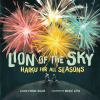
by Laura Purdie Salas
Book list In this charming, beautifully illustrated collection, arranged by season, Salas employs a form she calls riddle-ku, a first-person haiku that hints at the speaker, inviting readers to guess its identity, typically an object or being associated with a season. For example, Spring opens with I am a wind bird, / sky skipper, diamond dipper, / DANCING on your string, and López's accompanying illustration depicts a soaring, large, red, bird-shaped kite guided by a boy holding the string below. Summer showcases fireflies, baseball, and fireworks. Fall features a school building ( my first-day outfit / is fresh paint and polished floors / here come my new friends! ), apple picking, and jack-o'-lanterns, while Winter includes snow, ice skates, and a hibernating animal: In fur coat and cave / I exhale white clouds of breath, / DREAM of sun . . . green . . . spring. The eloquent language ranges from philosophical to whimsical, and that tone is reflected in the colorful acrylic paintings, which nicely combine realism and abstract touches and provide visual clues. An author's note offers the inspiration behind her riddle-ku, with encouragement for readers to create their own; an answer key; and a further-reading list. While the riddles' mystique may wane once little ones solve them, the wonderfully evocative, vivid imagery in text and art also make this a welcome addition for poetry classroom units.--Shelle Rosenfeld Copyright 2019 Booklist From Booklist, Copyright © American Library Association. Used with permission. Kirkus In this spirited collaboration, Salas and Lpez present 24 suggestive poetic snapshots chronicling the cycle of a year. Highlighting season-appropriate objects for spring, fall, summer, and winter, Salas magnifies the spareness of the haiku form by turning each concentrated first-person portrait into a riddle as she tantalizingly omits naming the subject describing itself. Meanwhile Lpez offers young and pre-readers florid visual hints, depicting in deft brush strokes and lush colors the author's hidden subjects. Combined, these artists render objects gentle as summer's fireflies ("fire in our bellies / we FLICKER-FLASH in twilight / rich meadow of stars") or winter's snowflakes ("I'm cold confetti / falling from a crystal sky, / blanketing the town," here shown as a white-roofed town in a snow globe painted against a wintry verdigris sky spackled with haphazard white blots) or bold as a fall jack-o'-lantern ("I perch on the porch, / spooky face frozen in place, / fire BURNING inside"glowering large with flaming orange eyes as the finger of a ghostly trick-or-treater rings the doorbell in the background). What sets this volume apart from similar haiku explorations of the seasons is the tight synthesis of visual object and oblique verbal depiction, making for both wonderfully contemplative experiences of each illustrated poem and the seamless progression of nature's cycle through the year.Richly rewarding and clever: a visually arresting, inventive treatment of a popular subject. (Picture book/poetry. 5-10) Copyright Kirkus Reviews, used with permission. Copyright © Kirkus Reviews, used with permission. Publishers Weekly Organized in four sections beginning with spring, Salas's lovely haiku are written in the voices of animals and organic or inanimate objects related to the seasons. "Fire in our bellies,/ we FLICKER-FLASH in twilight-/ rich meadow of stars," speak the summer's fireflies. Each haiku contains a riddle element-readers must guess the narrator (in an author's note, Salas refers to the form as a "riddle-ku"). It's not always clear who, or what, is speaking, but LA3pez's evocative acrylics visually communicate the imagery within the poems. "I'm a WRIGGLING tube,/ soft underground tunneler-/ I fear early birds," one announces. The small bird hovering over a hole clues readers in to the speaker's identity: a worm. The book's meditative tone and resonant images invite readers to embrace new ways of seeing the world around them. Ages 5-9. (Apr.) © Copyright PWxyz, LLC. All rights reserved. (c) Copyright PWxyz, LLC. All rights reserved Horn Book Divided into four sections by season, these "riddle-ku" poems use innovative language to represent something traditionally associated with each one. (For back-to-school in fall, for example: what is "a yellow train / carrying thoughts from your brain / to the waiting page?" A pencil.) In addition to helping readers solve the puzzles, the supporting acrylic and digital illustrations capture movement and texture through strong lines and seasonal hues. (c) Copyright 2019. The Horn Book, Inc., a wholly owned subsidiary of Media Source, Inc. No redistribution permitted. (c) Copyright The Horn Book, Inc., a wholly owned subsidiary of Media Source, Inc. No redistribution permitted. School Library Journal Gr 1-4-A sleek bird kite flown by a child in springtime kicks off this poetic collection of seasonal objects, animals, and activities. Six poems per season invite audience observation and enjoyment. First-time readers may not realize that each haiku is also a riddle with a list of answers found at the end of the book. Only in her concluding author's note does Salas describe the structure she calls "riddle-ku." Readers are meant to guess the identity of the non-human narrator in each poem. She also notes that the non-human voices make these "mask poems." Simple instructions then encourage readers to compose their own riddle-ku. The expansive acrylic scenes featuring children, animals and/or objects offer visual cues about the narrators. For instance, the leaves talk as a child happily bounces in a pile of them. Salas often sets a playful tone and is adept with language. Her diction and syntax are simple and fun. Paired with other seasonal materials, this book offers ample discussion and teaching opportunities with individual readers or groups. VERDICT This well-crafted work contains versatile possibilities for classrooms and libraries.-Margaret Bush, Simmons College, Boston © Copyright 2019. Library Journals LLC, a wholly owned subsidiary of Media Source, Inc. No redistribution permitted. (c) Copyright Library Journals LLC, a wholly owned subsidiary of Media Source, Inc. No redistribution permitted. |


